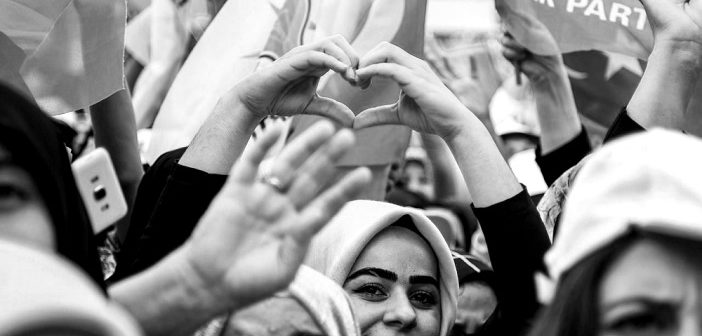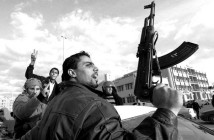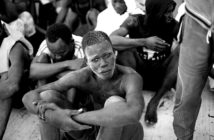Back in January, when there was no talk of snap elections, I made the following prediction about President Recep Tayyip Erdoğan’s regime: “The Justice and Development Party (AKP) was elected into power, but the regime will not be ousted through elections. Because falling from power would inevitably land regime officials in front of the High Court. It would behoove the opposition to come to terms with this sheer reality and begin questioning its most basic assumptions.”
* * *
At the beginning of this month, I was observing: “The regime lost long ago, likely in 2013—the year when peaceful Gezi protests in Istanbul were brutally crashed and when an extensive corruption scandal implicated top government officials, including President Erdoğan’s family, in money laundering and embezzlement schemes. They are obviously in a state of panic because they fear the reckoning they could be made to face.
This panic has taken hold not only of the regime, but also the huge mass of regime supporters. They would have to pay a price for the undue benefits and unwarranted positions they got and the violence they used against their fellow citizens.
Thus political Islamists in general realize that if they fall from power, they will never ever return.
Consequently, this mass is an existential struggle to survive. They are forced to defend their current positions at all costs.”
With the recent elections, the Turkish political system has completed its transformation into an executive presidential system without checks and balances. The regime and its leader view the new system as their chance to forever escape the sword of justice.
This heavy handed, arbitrary system grants all decision-making power to a narrow team in the presidential palace, relegates Parliament to be the president’s notary and the judiciary his obedient servant. The system privileges quick fixes above consultation, deliberation, transparency and accountability. How long could such a system last?
As for the economy, the only option left to the regime is to expand the public debt. The ratio of government debt to national income is only around 40%. Add private debt and it goes to 70%. It has more room to borrow and spend, but paying off the debt has become quite a challenge.
All of the other indicators are in the red. Election-related expenditures, military ventures, prodigal spending, and the president’s refusal to raise interest rates have put the economy at risk of a fatal crisis.
With all of the power granted to it through the elections, the regime no longer has any use for the state of emergency that has been in effect for nearly two years. It would lift the state of emergency, which will boost the ratings. Bewildered money traders might see the election results as signs of stability, but every economic indicator points to tumultuous times ahead.
As for politics, some analysts predict that since Erdoğan has achieved everything he wanted, he might now mellow out in his domestic and foreign policy. This is currently not possible. It is conceivable that he might “pardon” some prisoners in his “magnanimity”, but no acquittal. As for the talk of return to peace talks with the Kurds, it is anti-ethical to the nature of fascism; it is simply a pipe dream.
Today Turkey is home to a multi-polarized society, a collapsing economy, ruined state institutions, destroyed natural and cultural resources, an aggressive foreign policy and a totalitarian regime. In short, it is a country that cannot be governed.
Let’s turn to the opposition. In addition to HDP (The Peoples’ Democratic Party, pro-minority political party, mainly Kurdish) there is now another meaningful opposition figure, the candidate of CHP Muharrem Ince, the top contender at the presidential race. How much support he will get from his obsolete party, whether he will be able to transform it, time will tell.
As for the opposition coalition that ran against the AKP (Erdoğan’s party), this was a group of disparate parties that were united only in their opposition to Erdoğan. It is unlikely that their coalition will survive the electoral defeat. The coalition simply opposed Erdoğan, it was neither an “antifascist” nor a “democratic” coalition.
Otherwise lawmaking is no more the Grand National Assembly’s fundamental task; it is transformed into a comfortable notary institution. It will not make any sense for the opposition but might push the opposition to be closer to the electorate. On the other hand some can be satisfied with their sweet salary.
If we look at the campaign, it’s now proven that “let’s not spoil people’s morals” addressed to dubious observers who were predicting the outcome, couldn’t be a policy in itself.
The delusion that lot of hope and an election with two votes could overcome fascism was merely a way of delaying serious inquiry into how Turkish society arrived at this point in the first place. And to the contrary, accepting living with the same problems constantly.
Commentators who have difficulties to accept the election results are responsible for failing to appreciate the extent to which fascism had settled in Turkey. They gave people false hopes. They contributed to the depressive mood that has spread in the aftermath of the election.
Understanding the Erdoğan phenomenon and the regime he is working to establish since years requires more than studying Erdoğan’s background, his political party, his close circles, his business relationships, Turkey’s political history, mistakes made by past elites, as well as academic classifications and solutions. It requires understanding the masses that support his regime, those masses Hannah Arendt was microscopically studying…
Erdoğan’s followers, whom he refers to as the “majority,” “national will,” and “glorious nation,” harbor glaring fascist attributes. These cohesive masses stick to the power through brutality and venality.
Sunday night proved that simply complaining about the lawlessness of the regime, which gradually formed a “new legal order” outside the parameters of the existing one, is useless.
Of course, pointing out at the infractions to law and keeping tallies of illegal actions is of vital importance. But for years, as “the new legal order” normalized previously unacceptable acts, law community refused to take the new system seriously. Now, the leader and the regime have been forced down the country’s throat, and opinion leaders still continue arguing about the gender of the angels as the priests during the siege of Constantinople.
Unlike early 20th century Germany, Italy, or Russia, totalitarianism in Turkey did not result from crises that shattered society. Rather, it arose from a country that was a model nation with a promising economy and European Union ambitions.
Where Turkish totalitarianism came from, and what lies at its core have yet to be studied in depth. Such studies will hopefully be conducted as now fascism deepens and spreads.
* * *
Turkey’s Erdoğan problem has turned into a matter encompassing half of Turkey’s population. This fact cannot be tackled with optimism, invectives, irony and sarcasm; it demands politics in the noble sense of the word.
Would Turkey’s poor democratic credentials manage to cope with this monster or the entire country will also go the goose-step; the answer will depend on the brutality of the unavoidable collapse.





1 Comment
Turkey is a very interesting example for politologie and your article brings a lot of important informations. We should know then that fascism as a product of the post 1918 situation was always per definition linked with an industrial imperialist bourgeoisie that was limited in its capacities of expansion allied with impoverished by the crisis of the system middle classes and petit bourgeois right wing war veterans who could be mobilised in militias such as SA and then SS. That’s why there were military dictatorships but no real totalitarian, one mass party fascist systems in under developed and dominated or peripheral countries such as Spain, Chile, Portugal, Hungary, Greece, China, Egypt, Salvador, Brazil etc. The question about Turkey is then to define if this country has an imperialist bourgeoisie and an impoverished middle class able to mobilise within a totalitarian, expansionist, ethnonationalist ideology and one party system. And then, If AKP style, organisation and ideology can be compared to a nazi or fascist mass party and ideology. Or does it belong to another political category ? A Fascist ultra-nationalist panturkish party exists in Turkey and is even allied with AKP but on the periphery of the system because it represents peripherical social groups in a country which is still more a third world neocolonial one than a first world imperialist. In such situation we have to ask who represents in Turkey the national bourgeoisie that could be opposed to the local compradore bourgeoisie linked with the global bourgeoisie of the US “Deep state”. If AKP has mostly “national” roots and interests, then it will always be an opportunistic and eventually very authoritarian but a non fascist totalitarian disciplined party, and if it is basically a NATO linked party, it cannot carry on a real autonomous policy like the German nazis or the Italian fascists or even the French collaborationists based on local expansionist industrial interests did. Maybe Erdogan wants his country to conquer regional hegemony but it seems impossible to realise since his economy is to weak, so his system cannot be stabilised in a fascist way and will never be coherent for ideological, social and economical reasons. Especially if we take into account that every muslim child knows that usure is forbidden in an islamic country …massively indebted. What was not a problem for Hitler.